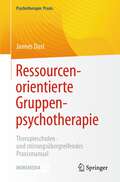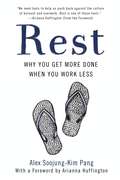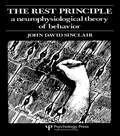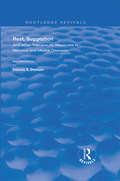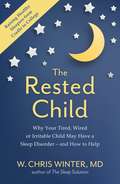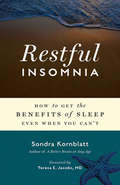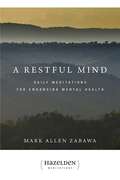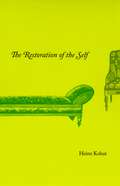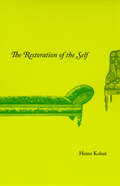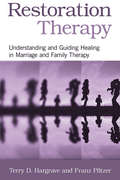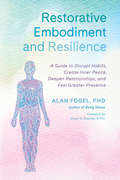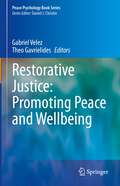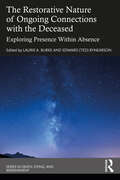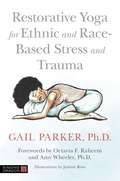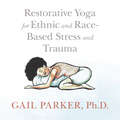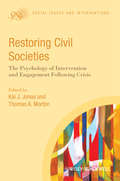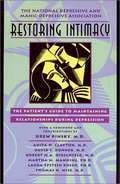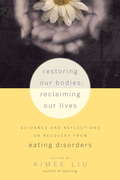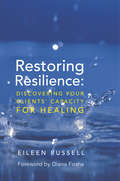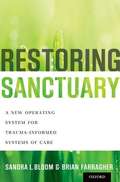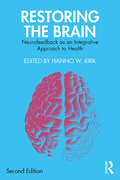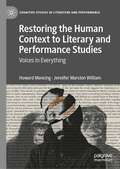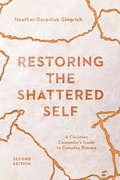- Table View
- List View
Ressourcenorientierte Gruppenpsychotherapie: Therapieschulen- und störungsübergreifendes Praxismanual (Psychotherapie: Praxis)
by Jannes DustDieses Buch soll Ihnen im Rahmen einer Kompetenzorientierung alles an die Hand geben, was Sie für die Leitung einer ressourcenorientierten Gruppenpsychotherapie in der ambulanten und/oder stationären Behandlung brauchen. Anhand von konkreten Praxisanleitungen, zahlreichen Beispielen und übersichtlichem Arbeitsmaterial unterstützt Sie dieses Manual von der Vorbereitung über die Durchführung bis zur letzten Gruppensitzung. Es soll Ihnen Unsicherheiten nehmen, Sie auf schwierige Situationen in der Gruppe vorbereiten und Sie in der Findung Ihrer therapeutischen Haltung stärken. Aus dem Inhalt: Selbstheilungskräfte – Selbstfürsorge – Versorgung von Bedürfnissen – Ressourcenaktivierung – Selbstwertgefühl und Selbstwirksamkeit. Über den Autor:Jannes Dust, M.Sc. Psychologe, Psychologischer Psychotherapeut. Erfahrung in unterschiedlichen psychiatrischen Einrichtungen, mit Schwerpunkt Gruppenpsychotherapie. Niedergelassen in eigener Praxis in Bonn. Arbeitsschwerpunkte: Ressourcenorientierte Therapie, Gruppenpsychotherapie, Verhaltenstherapie, Strukturpathologie, Abhängigkeitserkrankungen und außergewöhnliche Erfahrungen.
Rest: Why You Get More Done When You Work Less
by Alex Soojung-Kim Pang"Rest is such a valuable book. If work is our national religion, Pang is the philosopher reintegrating our bifurcated selves."---Arianna Huffington, New York Times Book Review Overwork is the new normal. Rest is something to do when the important things are done—but they are never done. Looking at different forms of rest, from sleep to vacation, Silicon Valley futurist and business consultant Alex Soojung-Kim Pang dispels the myth that the harder we work the better the outcome. He combines rigorous scientific research with a rich array of examples of writers, painters, and thinkers—from Darwin to Stephen King—to challenge our tendency to see work and relaxation as antithetical. "Deliberate rest," as Pang calls it, is the true key to productivity, and will give us more energy, sharper ideas, and a better life. Rest offers a roadmap to rediscovering the importance of rest in our lives, and a convincing argument that we need to relax more if we actually want to get more done.
The Rest Principle: A Neurophysiological Theory of Behavior
by J. D. Sinclair John David SinclairFirst published in 1982. Routledge is an imprint of Taylor & Francis, an informa company.
Rest, Suggestion, and Other Therapeutic Measures in Nervous and Mental Diseases (Routledge Revivals)
by Francis Xavier DercumFirst published in 1919. Emphasis has been laid upon simple physiologic methods of treatment; such as rest, feeding and psychotherapy. In order that the principles underlying the application of these methods should be clearly appreciated, the author has unfolded, in as systematic a manner as possible, the problems presented by the exercise of function, rest and the various fatigue states. He has adopted a purely clinical interpretation of the neuroses, a clear comprehension of which is an indispensable preliminary to intelligent and successful treatment. In embracing physiologic methods, medicines and psychotherapy in one volume, the author has endeavoured to present a comprehensive discussion of the treatment of nervous and metnal disorders; especially of those which are functional in character.
The Rested Child: Why Your Tired, Wired, or Irritable Child May Have a Sleep Disorder - and How to Help
by W. Christopher WinterSleep disorders in children are on the rise. Experts have pronounced sleeplessness a 'hidden health crisis' for young people, with 10 percent of children presenting with diagnosable sleep disorders - but well over half are misdiagnosed. Every year, tens of thousands of children are treated for diseases such as diabetes, learning disorders, or chronic pain, when the real root cause of their ailment may actually be a sleep disorder for which they're not being treated.In this ground-breaking guide, neurologist and sleep expert Dr Chris Winter identifies the signs and symptoms of the most common sleep disorders affecting children today, and he empowers parents and caregivers to understand the steps necessary to address and treat their children's sleep problems. From common issues such as too much screen time and night terrors, to narcolepsy, sleep apnoea, and more, The Rested Child leaves no stone unturned. This book pulls back the curtain on the relationship between poor sleep quality and paediatric epidemics related to psychiatric health, rising obesity, ADD/ADHD, pain disorders, and other undiagnosed disorders of sleepiness and fatigue.Finally parents have a resource to help them uncover the root of their children's problems, and, more important, to provide the answers on how to help.
Restful insomnia: How to Get the Benefits of Sleep Even When You Can't (Conari Wellness)
by Sondra KornblattInsomnia has meant nights of frustration-until now. A new program, Restful Insomnia, helps insomniacs mimic the benefits of sleep so they can greet the mornings refreshed. If you are among the 70 million sleep-deprived Americans who do battle every night, take heart! This book will show you how to use your waking night hours to quiet your mind, replenish your creativity, and relax deeply. You'll come to accept your insomnia and discover how to derive enough of the benefits of sleep to be able to get up in the morning feeling refreshed.
A Restful Mind: Daily Meditations for Enhancing Mental Health
by Mark Allen ZabawaThe only meditation book designed to provide inspiration, support, and focus for those living with mental health problems.With A Restful Mind, Mark Allen Zabawa offers the first book designed to provide inspiration and support specifically for people living with mental health problems. A year of daily readings address the common life issues that arise for those with mental health problems and help those dealing with a disorder start or end each day more at peace with themselves and the world. By focusing thinking on positive, health-enhancing messages and presenting the kind of empathetic support that fellow contenders of emotional distress can offer, these meditations help you achieve the mental rest and self-acceptance needed for a balanced, healthy mind and peaceful life.
The Restoration of the Self
by Heinz KohutIn his foundational work The Restoration of the Self, noted psychoanalyst Heinz Kohut boldly challenges what he called "the limits of classical analytic theory" and the Freudian orthodoxy. Here Kohut proposes a "psychology of the self" as a theory in its own right- one that can stand beside the teachings of Freud and Jung. Using clinical data, Kohut explores issues such as the role of narcissism in personality, when a patient can be considered cured, and the oversimplifications and social biases that unduly influenced Freudian thought. This volume puts forth some of Kohut's most influential ideas on achieving emotional health through a balanced, creative, and joyful sense of self. "Kohut speaks clearly from his identity as a psychoanalyst-healer, showing that he is more of a psychoanalyst than most, and yet calling for major theoretical revisions including a redefinition of the essence of psychoanalysis."- American Journal of Psychotherapy
The Restoration of the Self
by Heinz KohutIn his foundational work The Restoration of the Self, noted psychoanalyst Heinz Kohut boldly challenges what he called “the limits of classical analytic theory” and the Freudian orthodoxy. Here Kohut proposes a “psychology of the self” as a theory in its own right—one that can stand beside the teachings of Freud and Jung.Using clinical data, Kohut explores issues such as the role of narcissism in personality, when a patient can be considered cured, and the oversimplifications and social biases that unduly influenced Freudian thought. This volume puts forth some of Kohut’s most influential ideas on achieving emotional health through a balanced, creative, and joyful sense of self."Kohut speaks clearly from his identity as a psychoanalyst-healer, showing that he is more of a psychoanalyst than most, and yet calling for major theoretical revisions including a redefinition of the essence of psychoanalysis.”—American Journal of Psychotherapy
Restoration Therapy: Understanding and Guiding Healing in Marriage and Family Therapy
by Terry D. Hargrave Franz PfitzerHow can a therapist help his or her clients and ensure that they continue to maintain the insights and motivations learned during therapy in everyday life, beyond termination? Restoration Therapy is a professional resource that introduces the reader to the essential elements of its namesake, and from there guides clinicians to a systemic understanding of how certain forces lead to destructive cycles in relationships, which perpetuate more and more dysfunction among members. Clients and therapists both will understand issues more clearly, experience the impacts that emotion can have on insight, and practice the process so more loving and trustworthy relationships can take hold in the intergenerational family.
Restoration Therapy: Understanding and Guiding Healing in Marriage and Family Therapy
by Terry D. Hargrave Franz PfitzerHow can a therapist help his or her clients and ensure that they continue to maintain the insights and motivations learned during therapy in everyday life, beyond termination? Restoration Therapy is a professional resource that introduces the reader to the essential elements of its namesake, and from there guides clinicians to a systemic understanding of how certain forces lead to destructive cycles in relationships, which perpetuate more and more dysfunction among members. Clients and therapists both will understand issues more clearly, experience the impacts that emotion can have on insight, and practice the process so more loving and trustworthy relationships can take hold in the intergenerational family.
Restorative Embodiment and Resilience: A Guide to Disrupt Habits, Create Inner Peace, Deepen Relationships, and Feel Greater Presence
by Alan FogelAn expanded take on traditional Embodied Self-Awareness therapy, ideal for practitioners in all areas of body-focused work, including yoga, meditation, and somatic psychotherapyEmbodied Self-Awareness (ESA) is a somatic approach to treat trauma and other mental health concerns by helping people connect directly to thoughts, sensations, and emotions as they arise within the body. Here, psychologist Alan Fogel introduces Restorative ESA, an expansion of traditional ESA that incorporates three new and unique ESA states: Restorative, Modulated, and Dysregulated. Using a research-backed approach, Fogel explains their underlying neuroscience with concrete examples to illustrate how these states impact our personal and professional lives. Fogel shows that wellness is more than the ability to moderate one&’s inner state by regulating and tolerating emotions. By shi ing from states of doing to allowing, from activation to receptivity, and from thinking to felt experience, we can access the expansive power of the restorative state and heal the body, mind, and spirit.
Restorative Justice: Promoting Peace and Wellbeing (Peace Psychology Book Series)
by Gabriel Velez Theo GavrielidesThis timely collection of chapters written by international experts bridges the gap between peace psychology and restorative justice. The Editors combined their respective fields of expertise to start a much-needed debate on the potential but also risks that are associated when implementing restorative justice in the peace psychology field. The volume highlights how psychological theory and research can inform and evaluate the potential of restorative practices in formal and informal educational settings as well as the criminal justice space. The chapters cover both negative and positive peace across levels while introducing the reader to various case studies from across the world. All in all, the book explores how restorative justice can promote positive peace through its connection fostering dialogue, empathy, forgiveness, and other key psychological elements of peace.
The Restorative Nature of Ongoing Connections with the Deceased: Exploring Presence Within Absence (Series in Death, Dying, and Bereavement)
by Laurie A. BurkeThe Restorative Nature of Ongoing Connections with the Deceased is a guide to stimulating thought and discussion about ongoing attachments between bereaved individuals and their deceased loved ones. Chapters promote broad, inclusive training and dialogue for working with clients who establish and/or maintain a restorative connection with their deceased loved one as well as those who find aspects of such connections to be psychologically or spiritually problematic or troublesome. Bereavement professionals will come away from this book with a better understanding and a deeper skillset for helping clients to develop continuing bonds.
Restorative Yoga for Ethnic and Race-Based Stress and Trauma: A Visual Introduction (Therapeutic Parenting Bks.)
by Gail ParkerPresenting ways in which Restorative Yoga can contribute to healing emotional wounds, this book invites yoga teachers, therapists and practitioners to consider the psychological impact of ethnic and race-based stress and trauma. It aids in the process of uncovering, examining, and healing one's own emotional wounds and offers insight into avoiding wounding or re-wounding others. The book describes how race-based traumatic stress differs from PTSD and why a more targeted approach to treatment is necessary, as well as what can trigger it. It also considers the implications of an increasingly racially and ethnically diverse and global yoga community, as well as the importance of creating conscious yoga communities of support and connection, where issues of race and ethnicity are discussed openly, non-defensively and constructively.By providing a therapeutic structure that assists those directly and indirectly impacted by ethnic and race-based stress and trauma, Restorative Yoga for Ethnic and Race-Based Stress and Trauma provides valuable tools for aiding in the processing of stressful experiences and in trauma recovery.
Restorative Yoga for Ethnic and Race-Based Stress and Trauma
by Gail ParkerPresenting ways in which Restorative Yoga can contribute to healing emotional wounds, this book invites yoga teachers, therapists and practitioners to consider the psychological impact of ethnic and race-based stress and trauma. It aids in the process of uncovering, examining, and healing one's own emotional wounds and offers insight into avoiding wounding or re-wounding others. The book describes how race-based traumatic stress differs from PTSD and why a more targeted approach to treatment is necessary, as well as what can trigger it. It also considers the implications of an increasingly racially and ethnically diverse and global yoga community, as well as the importance of creating conscious yoga communities of support and connection, where issues of race and ethnicity are discussed openly, non-defensively and constructively.By providing a therapeutic structure that assists those directly and indirectly impacted by ethnic and race-based stress and trauma, Restorative Yoga for Ethnic and Race-Based Stress and Trauma provides valuable tools for aiding in the processing of stressful experiences and in trauma recovery.(P)2021 Hodder & Stoughton Limited
Restoring Civil Societies: The Psychology of Intervention and Engagement Following Crisis (Contemporary Social Issues #11)
by Kai J. Jonas Thomas A. MortonBreakdowns in civil societies can be catalyzed by factors ranging from war and genocide to natural disaster, disease and economic downturns. Restoring Civil Societies examines social processes related to civic engagement in the wake of these societal ruptures. The authors show how crises in civil society can be both pervasive and localized, broad-based and limited to defined social sub-groups. Whatever their scale, Restoring Civil Societies identifies models that analyze the social psychology of crises in order to devise ways of re-activating civic engagement and safeguarding civil society. Focusing on these positive interventions, the authors identify a number of key strategies, ranging from the simplicity and directness of bystander interventions to the volunteer armies mobilized in the wake of natural disasters. They include collective action organized to redress systemic inequalities, and the vital healing role played by truth commissions in Rwanda and elsewhere. Restoring Civil Societies fills the gap between basic research on social issues and translation into social policies and programs-an area which, in light of current economic and social unrest, is more important now than ever.
Restoring Intimacy: The Patient's Guide to Maintaining Relationships during Depression
by National Depressive And Manic-Depressive AssociationThe strongest of personal relationships are tested by depression. Depression leaves partners, friends, and loved ones with many questions, and few comfortable places to turn for answers.
Restoring Intimacy: The Patient's Guide to Maintaining Relationships During Depression
by Drew Pinsky Anita H. Clayton David L. Dunner Martha M. Manning Laura Epstein Rosen Thomas N. Wise Robert M. A. HirschfeldThis handy booklet includes self-tests to help a person determine whether depression is present. It guides patients and those who care about them through the maze of treatment options and diagnostic terms. It addresses the affects of illness and medication on sexual performance and intimacy. Although it presents a lot of technical information, the book never becomes tedious or difficult to read.
Restoring Our Bodies, Reclaiming Our Lives: Guidance and Reflections on Recovery from Eating Disorders
by Judith D. Banker Aimee LiuFull recovery from an eating disorder is possible. Despite what you may have been led to believe, most people with anorexia, bulimia, or binge eating disorder are able to completely restore their health and well-being. But how does this happen? Author Aimee Liu has woven together dozens of first-person accounts of recovery to create a break-through roadmap for healing from an eating disorder. Restoring Our Bodies, Reclaiming Our Lives answers key questions including: How does healing begin? What does it feel like? What supports and accelerates it? Will I ever be free of worry about a relapse? Throughout the book are informative sidebars written by leading professionals in the field, addressing essential topics such as finding the right therapist, the use of medications, exploring complementary treatments, and how family members can help. Learn more at the author's website: www.aimeeliu.net.
Restoring Resilience: Discovering Your Clients' Capacity for Healing
by Eileen Russell Daniel A. Hughes Diana FoshaCultivating what is right, rather than focusing on what is wrong, for therapy that works. People enter therapy not just because they are stuck and struggling, but also because they are ready for change and have some hope of experiencing it. That readiness is a manifestation of each person's innate resilience, their capacity to work on their own behalf to heal. Many of the common modes of clinical work focus on pathology, the effects of habits or conditions that can be healed through clinical work. Eileen Russell, without discounting the importance of pathology, offers us the idea that the best way to help with what's going wrong in people's lives is to build from the foundation of what's going right. In this book, therapists will learn how to identify the potential for resilience in clients and help them cultivate and deepen it for lasting change. Drawing on interpersonal neurobiology and affect regulation research, as well as a number of theoretical orientations including Accelerated Experiential Dynamic Psychotherapy, Focusing, attachment theory, and EMDR, Russell provides the essential tools and background for any therapist interested in engaging in resilience-oriented therapy. She includes a wealth of thoughtfully annotated examples from her own clinical work, shares inspiring, illuminating stories of patients who have become more resilient through therapy, and offers many practical tips for clinicians along the way.
Restoring Sanctuary: A New Operating System for Trauma-Informed Systems of Care
by Sandra L. Bloom Brian FarragherThis is the third in a trilogy of books that chronicle the revolutionary changes in our mental health and human service delivery systems that have conspired to disempower staff and hinder client recovery. Creating Sanctuary documented the evolution of The Sanctuary Model therapeutic approach as an antidote to the personal and social trauma that clients bring to child welfare agencies, psychiatric hospitals, and residential facilities. Destroying Sanctuary details the destructive role of organizational trauma in the nation's systems of care. Restoring Sanctuary is a user-friendly manual for organizational change that addresses the deep roots of toxic stress and illustrates how to transform a dysfunctional human service system into a safe, secure, trauma-informed environment.
Restoring the Brain: Neurofeedback as an Integrative Approach to Health
by Hanno W. KirkThis thoroughly updated second edition of Restoring the Brain is the definitive book on the theory and the practice of Infra-Low Frequency brain training. It provides a comprehensive look at the process of neurofeedback within the emerging field of neuromodulation and essential knowledge of functional neuroanatomy and neural dynamics to successfully restore brain function. Integrating the latest research, this thoroughly revised edition focuses on current innovations in mechanisms-based training that are scalable and can be deployed at any stage of human development. Included in this edition are new chapters on clinical data and case studies for new applications; using neurofeedback for early childhood developmental disorders; integrating neurofeedback with psychotherapy; the impact of low-frequency neurofeedback on depression; the issue of trauma from war or abuse; and physical damage to the brain. Practitioners and researchers in psychiatry, medicine, and behavioral health will gain a wealth of knowledge and tools for effectively using neurofeedback to recover and enhance the functional competence of the brain.
Restoring the Human Context to Literary and Performance Studies: Voices in Everything (Cognitive Studies in Literature and Performance)
by Howard Mancing Jennifer Marston WilliamRestoring the Human Context to Literary and Performance Studies argues that much of contemporary literary theory is still predicated, at least implicitly, on outdated linguistic and psychological models such as post-structuralism, psychoanalysis, and behaviorism, which significantly contradict current dominant scientific views. By contrast, this monograph promotes an alternative paradigm for literary studies, namely Contextualism, and in so doing highlights the similarities and differences among the sometimes-conflicting contemporary cognitive approaches to literature and performance, arguing not in favor of one over the other but for Contextualism as their common ground.
Restoring the Shattered Self: A Christian Counselor's Guide to Complex Trauma (Christian Association for Psychological Studies Books)
by Heather Davediuk GingrichNearly every professional counselor will encounter clients with a history of complex trauma.Restoring the Shattered SelfDSM-5
